Starborn: How the Stars Made Us
Air Date: Week of July 5, 2024
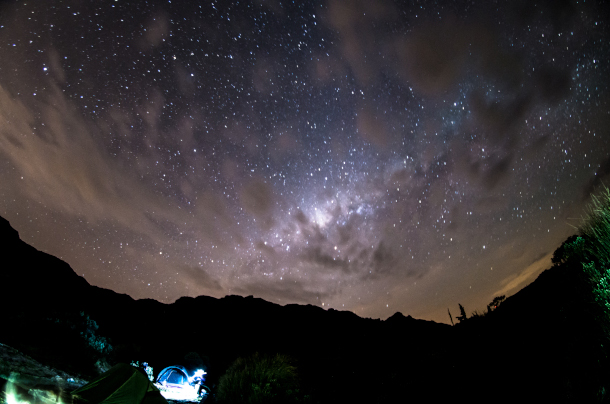
Roberto Trotta often says, “The night sky is humankind's only truly global common, shared by all of us across civilizations and millennia”. (Photo: Daniel Delli, Wikimedia Commons CC BY 2.0)
Stargazing has profoundly shaped who we are as human beings, and gave rise to science, religion, and origin stories from diverse traditions. Roberto Trotta, a cosmologist at the International School for Advanced Studies in Trieste, Italy, explores this legacy in his book Starborn: How the Stars Made Us (And Who We Would Be Without Them). He joins Host Jenni Doering to discuss how studying the night sky shaped science and more and why satellites now threaten our connection to the stars.
Transcript
O’NEILL: It’s Living on Earth, I’m Aynsley O’Neill
DOERING: And I’m Jenni Doering.
If you went to summer camp as a kid, perhaps you slept out under the night sky, the Milky Way spread out like a bright blanket threaded now and then with shooting stars. Stargazing is one of the simple pleasures of life but it’s also profoundly shaped who we are as human beings. Science, religion, and origin stories from diverse traditions have all been deeply connected to the human tendency to gaze up at the night sky. Roberto Trotta is a cosmologist at the International School for Advanced Studies in Trieste, Italy, and he has often wondered what our species might have been like if we had never been able to see the stars. Some planets, like Venus, are eternally shrouded in clouds, so even if intelligent beings had evolved to survive its extreme climate, they would never see the universe beyond. And if our view of the heavens was obscured, Roberto Trotta says it’s possible advanced civilizations capable of traveling out into space would have never developed. His new book is called Starborn: How the Stars Made Us (And Who We Would Be Without Them), and Professor Trotta joins us now. Welcome back to Living on Earth!
DOERING: Thank you, I'm thrilled to be back. So I think we really take for granted the stars that we see at night if we're, you know, lucky enough to have dark enough skies to see those stars. And as you write astronomy was the midwife to all the sciences. Why is that?
TROTTA: Because astronomy was the first of what then become sciences to actually have access to a plethora of quantitative data. That was, of course, in the 16th century when astronomers started working out, our place in the universe, started working out that the earth was not at the center of the solar system, but the sun was, which was, you know, the Copernican Revolution was an absolute paradigm shift of our conception of the universe we live in. But even before then, of course, for millennia, the stars have drawn the attention of humanity, starting from history, as I argue in the book, but also in historical times, we had all these priests and these high sacred people who will look up at the sky, try to divine the future, try to understand what the position and the movement of the planets, and the stars would mean for humanity for the king, for example, for the pyre and so on. The practice of astrology, which is very much disparaged today was very, very important in our past, because it is through astrology, that for thousands of years, humankind kept up their interest for the stars. And we often forget that when the 16th century came around, and a scientific revolution came around, many of the central characters of the scientific revolution, Copernicus, Galileo, the Tycho Brahe, Kepler, they were all astrologers as well as astronomers because the kings and other high place people who paid the salaries, paid the salaries just as much for their observations as for their divination. And so, you know, astrology was very important, and that led to astronomy and astronomy at that point, had this very long tradition of data observation, interests for the sky, after which quantitative science and physics sprang. Without astronomy, Newton wouldn't have written down the laws of gravitation, and physics will not exist as we know it and without physics, none of the other sciences.
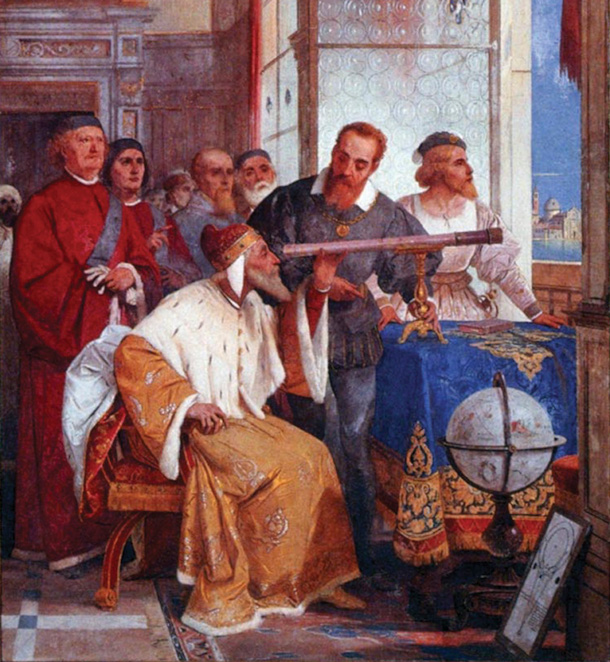
A fresco by Giuseppe Bertini of Galileo showing the Doge of Venice how to use the telescope he built in 1609. Galileo’s invention played an important role in advancing our understanding of Earth's place in the cosmos. (Painting: Giuseppe Bertini, Wikimedia Commons, Public Domain)
DOERING: It's so interesting to hear you talk about how something that was so unscientific, you know, especially considering it today, what we know you know, astrology actually did end up leading to careful observation and science itself.
TROTTA: Exactly. And all these patrons who really helped astrology along unwittingly, they also ushered in the scientific revolution eventually.
DOERING: How has our knowledge of time been shaped by the planets and cosmos?
TROTTA: Time is intimately related to the cycles in the sky, let alone the day night alternation that we mentioned, that's, of course, the most basic unit of time. But to go beyond that, to go beyond the simple observing that there is a period of light and a period of darkness that repeats every 24 hours, really, the moon was central the phases of the moon and the lunar cycle of 29.5 days was absolutely crucial in enabling the understanding that we can measure time spans that are longer than a day. And before that was one of the central planks, not just from a point of view, for example of the hunt, we can imagine prehistoric hunters gatherers, trying to time their hands with the full moon, because that's something that we have largely forgotten we never pay any attention to this. But if you are a hunter gatherer in a place in a world that's entirely dark, except for the cosmic luminaries above us, then you absolutely know that when the sun sets on the full moon night, that's when the moon rises. And that means that if you're still hunting prey out at dusk, out at sunset, the moon will follow up and illuminate the hunt, and will stay on for the whole night if needs be, and you can hunt down that prey that has perhaps escaped you. So probably the full moon was enabled not just the most fruitful hunts in prehistory, but also was giving rise to rituals for perhaps certain key rituals to celebrate that successful hunt. So timekeeping, as marked by the period of the Moon was absolutely central. And of course, even today, when we glance at the 12 subdivisions of a normal clock, we are without realizing it, we are looking at a series of stars that the Egyptians called the decans that followed series about 10 degrees apart in the sky, which is the reason why we subdivide the night and then the day also in 12 hours. And so, whenever we glanced at our watch, we are glancing deep into the past and deep into the stary origin of our timekeeping that has always been with us.
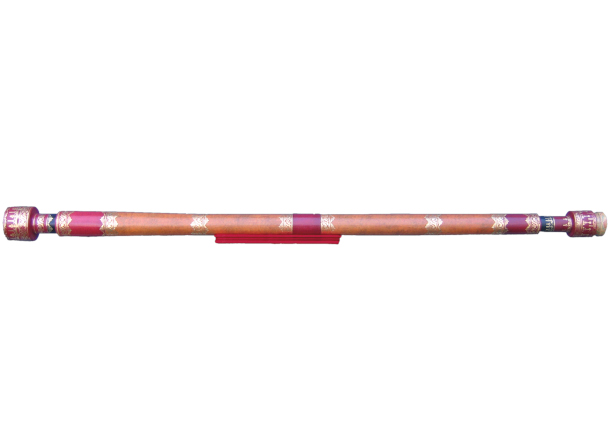
A replica of the earliest surviving telescope attributed to Galileo Galilei, on display at the Griffith Observatory. (Photo: Jim and Rhoda Morris, Wikimedia Commons, Public Domain)
DOERING: So we have to talk about Galileo Galilei, a very important astronomer. How did Galileo's observation of the stars through his telescope shape astronomy?
TROTTA: Galileo in 1610 did something absolutely extraordinary. The significance of which slightly escapes us today because we're so used to it now. But when he heard that something that we now call a telescope, had been invented in the Netherlands, it immediately set his genius in motion to try to build his own. And in fact, after 24 hours, he had built his own telescope with no instructions, no blueprint, nothing grinding the lens himself, and so on. And when he had this telescope fashioned for himself, he did a revolutionary thing. He took it, and he pointed it to the sky. And it's a simple act of almost incredible daring, the fact that he wanted to see what matters were hidden in the sky, by the means of a device that could now give him a more powerful acuity and vision. And when he did that, all sorts of incredible sights opened up to his understanding and his ability to draw them actually. And he saw the moons of Jupiter, he discovered the fact that there were other moons revolving around another planet. He saw the phases of Venus, the fact that Venus changes its shape, just like the moon does, which is incontrovertible evidence for the fact that Venus actually orbits the Sun and not the earth. He studied the sun's sunspots, which had been already discovered, but he was the first to characterize them. He looked at the moon and he realized it's got craters and valleys and crevices and it's not that perfect object that Aristotle had said. And so the sky and the earth were made of the same substance and that was shattering in terms of changing our view of what the cosmos was made of. It's all of this together, really, any of these discoveries, and all of them together completely changed our view, not only of the universe around us, but also of our place in the universe, and our relationship with it.
DOERING: What a revolution. So Roberto, your book takes us all the way from ancient history through our relationship with the stars today. And I was fascinated, and frankly, quite alarmed to read in your book that our view of the stars is threatened today, not only by light pollution, of course, which I think a lot of us experience anyone who lives near a city, but also by artificial satellites. What's the impact of having thousands of satellites orbiting Earth?
TROTTA: Through my view, this is a dramatic ecological crisis that's unfolding silently and above our heads, without people really realizing it, and without much fuss about it. But it's as concerning there's other ecological crisis that unfortunately, we're witnessing in our time. And it's brought about by the fact that in the last few years, private companies, private space companies have launched thousands of internet satellites in low earth orbit that's 250 kilometers up, so they're relatively nearby. And space is fast becoming congested. So there is now about 10,000 satellites in near orbit. And according to some estimates that by 2030, there's going to be 100,000 satellites. And those satellites are mostly used for the purpose of providing internet service, fast internet service everywhere, at all times. But the downside, well there's many downsides, but a very concerning one is that being so low, they actually reflected the sun's light, especially at dusk through the solar panels, and also depending on the location and the season, throughout the night. And they show up as little moving dots across the firmament, which means that if you look up on a dark night, if you're lucky enough to leave under dark skies, which is increasingly difficult, of course because of light pollution, which means that you will see plenty of these little dot carving little lines across the sky. And by some estimates, unfortunately, I'm sad to report that by 2030, it's possible that we will see more artificial satellites in the sky than real stars, at which point, we will have lost the sky for good. We will never no where on earth have the opportunity to actually experience the sky, like our ancestors always had done and so will last forever, that connection with the beauty and inspiration of the eternal sublime, as Emerson put it. And that's happening, you know, launch after launch, it's happening fast and if it's not regulated or stopped soon, it will be too late to get it back.

Thousands of years ago in ancient Babylonia, astronomers divided the zodiac into equal-sized areas, each one corresponding to a constellation coalescing the analysis of the zodiac and constellations. The constellation of Orion is illustrated above. (Illustration: Johannes Hevelius, Wikimedia Commons, Public Domain)
DOERING: And that's nothing like going to a dark sky sanctuary can resolve. I mean, if they're up there, you're gonna see them.
TROTTA: Exactly. And that's dramatic, right? Because it's already difficult enough to find the dark sky sanctuary these days. But those satellites will be everywhere, they're running around all the globe, and so you won't be able to escape them. There is no mountain that's tall enough, there is no ocean that's offshore far enough for you to escape them because they're everywhere all the time. So that's a real loss, a tragic loss of perhaps what I think of as the last global common and actually the only truly global common that humanity has shared you know across cultures, across times. Since time immemorial, the sky has been you know, everybody's but space no longer is.
DOERING: It does seem like we'd have an impoverished experience of the sky at night. And what's the impact to science, if any?
TROTTA: Yes, there was a cultural impact which I just described but also there is a scientific impact because as the satellites pass in front of astronomers telescopes, both on Earth and in space, the live trains on the pictures that astronomers take of the deep sky. And that means that up to 50%, up to half of the data of the greatest sonic observatories are rendered unusable for research. So this has got a real cost in terms of essentially nullifying half of the billion dollar efforts that astronomers are putting into studying the sky, and making important programs more difficult. For example, asteroid tracking becomes more difficult because of these tracks left by the satellites and that's really important program. For example, in order to raise alarm in case asteroids are deflected, of course, or will be threatening to life on earth. All the satellites render this so much harder and it's a real scientific problem.
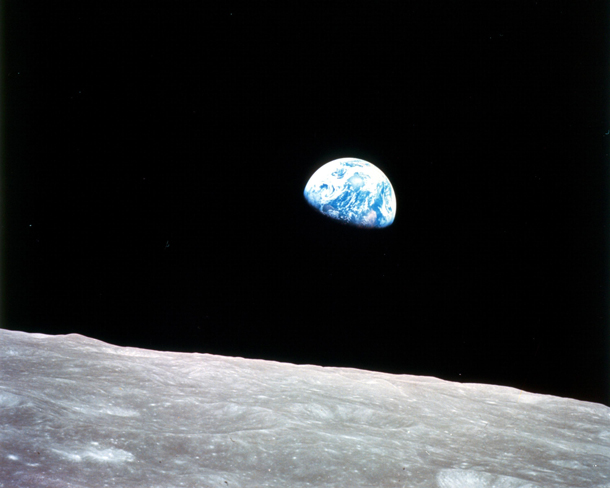
The overview effect is a mental transportation to “a state of awe” expressed by some astronauts while viewing the Earth from space. The image above was taken by Apollo 8 crewmember Bill Anders on December 24, 1968, at mission time 075:49:07 (16:40 UTC), while in orbit around the Moon, showing the Earth rising for the third time above the lunar horizon. (Photo: Bill Anders, Wikimedia Common, Public Domain)
DOERING: How do you think studying the stars and looking up the sky can inspire us to take better care of our planet?
TROTTA: I think it does and I think it does, because it affords us the opportunity for ones to see ourselves from a different cosmic perspective. Let me just backtrack for a second and talk for a minute about what is called the "Overview Effect", which is this mystical, if you want to call it that experience that many astronauts report when they get to see our fragile, beautiful blue and white planet from space. Right when they behold, this little globe floating in the darkness of space in the velvet of the universe and they realize that we're so fragile, we're so little, and all the squabbles, all the wars, all the terrible things that are happening to our planet really should not be happening because we need to see ourselves as being global citizens of one spaceship, spaceship earth. Which is our own only protection against the hostility of space. So that's the overview effect that many astronauts have reported feeling something move inside their heart or inside their soul, when they perceive Earth from that. And that's not available to everybody, of course, but we earthbound beings if we look up, we won't see ourselves from up there but we can still see what's out there and transport ourselves into this cosmic perspective and understand, in looking at the void between the glowing stars and looking at the majesty of the night sky, and realizing the smallness and the fragility of our life compared to that. I think that's a very important and very needed antidote to the hubris, the technologically driven hubris that's wreaking havoc to our planet. You know, think about loss of biodiversity, climate change, the terrible wars that we're witnessing every day, all of this needs to be put in a different perspective, in perspective of the stars. And if we start measuring our actions and the impact of our actions on the cosmic perspective, I think that the politics and the economics and the kinds of societies that we want to build on a planet will change radically. It could inspire us to build a better world.
DOERING: It is really special, this perspective that we're given by being able to look up at the stars send up instruments and people up there to look back at Earth.
TROTTA: Absolutely, and it's something that's been only afforded to us by the technology that was actually born out of the science that was ultimately given to us by the contemplation of the stars. So in a way, our understanding of the stars is something that we owe the stars themselves.
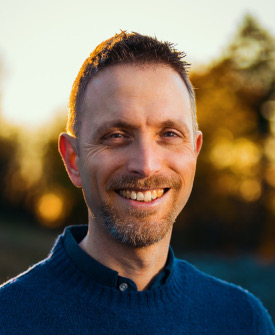
Roberto Trotta is a cosmologist at the International School for Advanced Studies (SISSA) in Trieste, Italy, where he is a Professor of Theoretical Physics and the head of the newly established group in Theoretical and Scientific Data Science. He’s also a Visiting Professor of Astrostatistics at Imperial College London and author of “STARBORN: How the Stars Made Us—and Who We Would Be Without Them”. (Photo: Courtesy of Roberto Trotta)
DOERING: So Roberto, the stars have been hugely important for humans for how our societies have developed. How important have they been in your life?
TROTTA: Well I realized that stars really shaped my life profoundly. And perhaps that's not so surprising for somebody who is a cosmologists by profession, and therefore very professional wouldn't even exist if it wasn't for the stars. But perhaps I hadn't realized fully how the stars had really changed the course of my personal history as much as my professional history. And that's also how I chose to actually open the book. And when I tell a story that I think prior to actually writing it in the book, I probably never told anybody. [LAUGH] And it's a story of how many, many years ago on a dark night in my native Switzerland, which is a landlocked country, which at that time, still enjoyed some quite dark skies, I had a date and my date and I were out for an evening at the theater and we were walking back home. And then we both happened to look up at the sky at a very special moment where something really special and quite magical happened. It was a meteor passing by a shooting star, if you like.
DOERING: Wow.
TROTTA: Which appeared to be the perfect, romantic moment that sparked well, something that was in the air but hadn't quite catalyzed yet. And many years later, when I actually came to reflect about my personal trajectory and history, I found myself looking into my wife's eyes and I saw the very same falling star reflected in there still, because that date that night later on 25 years plus later, that girl had become my wife. And I don't know whether that would have been quite the same story if that shooting star had not happen to fall precisely that night at that moment, in that circumstance that really, somehow brought some magic to the entire, to the entire thing and definitely changed the course of my life.
DOERING: Roberto Trotta is a cosmologist and astrophysicist and author of the book Starborn: How the Stars Made Us (and Who We Would be Without Them). Thank you for joining us.
TROTTA: Such a pleasure. Thank you for having me.
Links
Learn more about professor of Astrophysics and Data Science Roberto Trotta
Living on Earth wants to hear from you!
Living on Earth
62 Calef Highway, Suite 212
Lee, NH 03861
Telephone: 617-287-4121
E-mail: comments@loe.org
Newsletter [Click here]
Donate to Living on Earth!
Living on Earth is an independent media program and relies entirely on contributions from listeners and institutions supporting public service. Please donate now to preserve an independent environmental voice.
NewsletterLiving on Earth offers a weekly delivery of the show's rundown to your mailbox. Sign up for our newsletter today!
 Sailors For The Sea: Be the change you want to sea.
Sailors For The Sea: Be the change you want to sea.
 The Grantham Foundation for the Protection of the Environment: Committed to protecting and improving the health of the global environment.
The Grantham Foundation for the Protection of the Environment: Committed to protecting and improving the health of the global environment.
 Contribute to Living on Earth and receive, as our gift to you, an archival print of one of Mark Seth Lender's extraordinary wildlife photographs. Follow the link to see Mark's current collection of photographs.
Contribute to Living on Earth and receive, as our gift to you, an archival print of one of Mark Seth Lender's extraordinary wildlife photographs. Follow the link to see Mark's current collection of photographs.
 Buy a signed copy of Mark Seth Lender's book Smeagull the Seagull & support Living on Earth
Buy a signed copy of Mark Seth Lender's book Smeagull the Seagull & support Living on Earth

